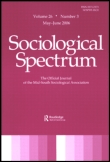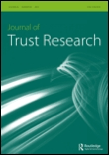
SOCIAL INDICATORS RESEARCH
Scope & Guideline
Exploring the Metrics of Human Experience
Introduction
Aims and Scopes
- Multidimensional Poverty Measurement:
The journal emphasizes the importance of multidimensional approaches to poverty, recognizing that income alone does not capture the full extent of deprivation experienced by individuals and communities. - Quality of Life Assessment:
Research published in the journal often explores various dimensions of quality of life, including health, economic stability, and social inclusion, using both subjective and objective indicators. - Social Cohesion and Trust:
The journal addresses the dynamics of social cohesion, trust, and their implications for community well-being, highlighting the role of social capital in fostering inclusive societies. - Impact of Policy Interventions:
There is a strong focus on evaluating the effectiveness of social policies and interventions aimed at improving well-being, particularly for vulnerable populations. - Inequality and Social Justice:
The journal publishes studies that investigate social inequalities, their determinants, and their impact on marginalized groups, aiming to promote social justice and equity. - Cultural Contexts of Well-Being:
Research often considers cultural factors and their influence on well-being perceptions and experiences, providing insights into how cultural contexts shape social indicators.
Trending and Emerging
- Digital Inclusion and Technology's Impact on Well-Being:
There is an increasing exploration of how digital technologies and financial inclusion can enhance well-being, especially in marginalized communities, reflecting the growing importance of digital literacy. - Mental Health and Well-Being:
Research addressing mental health issues, particularly in relation to economic adversity and social support, has gained momentum, highlighting the critical intersection of mental health and social indicators. - Climate Change and Social Vulnerability:
Emerging studies are focusing on the impacts of climate change on social vulnerability and well-being, reflecting the urgent need to understand how environmental factors influence social indicators. - Intergenerational Equity and Mobility:
There is a rising interest in intergenerational mobility and equity, particularly how social and economic factors influence opportunities for different generations. - Resilience and Adaptation in Social Contexts:
Research on resilience, particularly in the face of crises such as the COVID-19 pandemic, is trending, with a focus on how communities adapt and recover from social and economic shocks. - Social Capital and Community Engagement:
The role of social capital in enhancing community engagement and well-being has become a prominent theme, with studies examining how social networks contribute to resilience and quality of life.
Declining or Waning
- Traditional Economic Indicators:
There appears to be a waning interest in purely economic indicators of well-being, such as GDP, as researchers increasingly recognize the limitations of these measures in capturing the complexity of social quality. - Single-Dimensional Poverty Indices:
The focus on unidimensional poverty measures has decreased, with scholars advocating for more comprehensive, multidimensional frameworks that account for various forms of deprivation. - Static Models of Social Indicators:
Research employing static models to assess social indicators has become less common, as there is a growing preference for dynamic, longitudinal approaches that capture changes over time. - Homogeneous Global Indicators:
There is a diminishing focus on developing universal indicators that apply across diverse cultural and geographical contexts, as researchers emphasize the importance of context-specific measures. - Overemphasis on Quantitative Measures:
The reliance on quantitative measures without adequate qualitative insights has decreased, with a shift towards mixed-methods approaches that provide a more nuanced understanding of social phenomena.
Similar Journals

EUROPEAN JOURNAL OF PERSONALITY
Uncovering Insights into Human Behavior and PersonalityWelcome to the EUROPEAN JOURNAL OF PERSONALITY, a premier academic journal published by SAGE PUBLICATIONS LTD, dedicated to advancing the field of social psychology. With an impressive impact factor that places it in the Q1 category within its domain, this journal ranks 10th out of 310 in the Scopus database, firmly sitting in the 96th percentile. Since its inception in 1987, the EUROPEAN JOURNAL OF PERSONALITY has provided a platform for cutting-edge research that explores the intricate dynamics of personality and individual differences within social contexts. Researchers and professionals will find that the journal not only fosters scholarly exchange but also addresses critical issues relevant to contemporary psychology. Published in the United Kingdom, the journal is committed to maintaining high standards of scientific rigor and accessibility. As a vital resource for students and academics alike, it aims to inspire future research and deeper understanding in the psychological landscape.

Journal of Population Ageing
Illuminating the Future of Ageing SocietiesThe Journal of Population Ageing, published by SPRINGER INT PUBL AG, stands as a prominent platform for the exploration and dissemination of research within the fields of demography, geography, and sociology. With an ISSN of 1874-7884 and an E-ISSN of 1874-7876, this journal navigates the complexities of population ageing, a vital topic as societies worldwide confront the implications of an ageing demographic. The journal boasts impressive Scopus rankings, including the 30th rank in Demography and a 78th percentile in Sociology and Political Science, emphasizing its significant role in academic discourse. It is highly regarded in its Q2 category quartiles for Demography, Geography, Planning and Development, and Sociology and Political Science, showcasing its relevance and scholarly impact. Although not an open-access publication, the journal's carefully curated articles aim to inform and advance knowledge, making it an invaluable resource for researchers, professionals, and students invested in understanding the multifaceted challenges associated with an ageing population. With its comprehensive scope and commitment to quality, the Journal of Population Ageing continues to contribute meaningfully to the evolving conversation on demographic trends and their societal implications.

Poverty & Public Policy
Navigating the complexities of poverty and policy.Poverty & Public Policy is an esteemed journal published by WILEY that focuses on the intersection of poverty issues and public policies aimed at alleviating social disparities and enhancing quality of life. With an ISSN of 1944-2858, this journal serves as a critical resource for researchers, policymakers, and practitioners in the fields of Cultural Studies, Sociology, and Political Science. Recognized for its academic rigor, it boasts a commendable Q1 ranking in Cultural Studies and a Q2 classification in Sociology and Political Science as per the 2023 quartiles. The journal is accessible to a diverse audience and aims to provide insights and analyses that foster a deeper understanding of poverty-related challenges and policy responses. Converging from 2009 to 2024, it continues to contribute to scholarly discourse and policy formation, making it an indispensable addition for anyone committed to addressing the complex issues surrounding poverty on a global scale.

Calidad de Vida y Salud
Transforming Health Outcomes, One Study at a Time.Calidad de Vida y Salud is a premier academic journal dedicated to the fields of public health, quality of life, and health sciences, published by UNIV FLORES in Buenos Aires, Argentina. With a commitment to fostering research that enhances understanding of health-related quality of life, this journal serves as an essential resource for scholars, healthcare professionals, and students interested in the intersection of health and well-being. The journal, identified by its ISSN 1850-6216, aims to provide an open platform for rigorous and innovative research, promoting evidence-based practices that can lead to improved health outcomes within communities. With a focus on recent advancements and challenges in healthcare, Calidad de Vida y Salud plays a crucial role in disseminating knowledge that is relevant and impactful. Researchers and practitioners alike will find valuable insights and a supportive academic environment for their work in this vital area of study.

SOCIOLOGICAL SPECTRUM
Exploring the complexities of society and politics.Sociological Spectrum is a prestigious journal published by Taylor & Francis Inc, dedicated to advancing scholarship in the fields of sociology and political science. With a notable impact factor and ranked in the Q1 category for both disciplines, this journal stands out as a vital resource for researchers, professionals, and students seeking to engage with cutting-edge research and theoretical developments from 1981 through 2024. The journal’s Scopus rank places it in the top 78th percentile within the social sciences community, reflecting its significant contribution to the field. While the journal is not open access, it provides comprehensive insights and fosters critical discussions around contemporary sociopolitical issues, making it an essential avenue for scholarly communication. Published in the United Kingdom, the ISSN 0273-2173 and E-ISSN 1521-0707 editions ensure broad accessibility, serving an international audience dedicated to the complexities of societal structures.

Journal of Trust Research
Fostering Interdisciplinary Dialogue on TrustThe Journal of Trust Research, published by Routledge Journals, Taylor & Francis Ltd, stands at the forefront of interdisciplinary inquiry into the concept of trust, spanning critical areas such as Applied Psychology, Sociology, and Business Management. Since its inception in 2011, this journal has been dedicated to fostering innovative research and dialogue around trust dynamics in various contexts, making significant contributions to understanding human relationships and social structures. With a commendable positioning in Q3 for its fields in the 2023 category quartiles, it serves as a vital resource for academics, practitioners, and students interested in the mechanisms and implications of trust. Though currently not offering open access, the journal boasts a reputation for rigorous peer review and impactful scholarship, ensuring that published articles resonate with both scholarly and practical communities. Researchers are encouraged to submit their work as the journal aims to advance theoretical frameworks and practical applications in trust research through to 2024 and beyond.

Journal of Economic Inequality
Uncovering insights that drive social change.The Journal of Economic Inequality is a leading interdisciplinary platform dedicated to advancing the understanding of economic disparities and their implications for society. Published by SpringerNature, this journal has achieved an impressive standing within the academic community, featured in the prestigious Q1 quartile across multiple categories, including Economics, Econometrics and Finance, Organizational Behavior and Human Resource Management, and Sociology and Political Science as of 2023. With an emphasis on high-quality empirical research and theoretical contributions, the journal serves as an essential resource for scholars and practitioners alike seeking in-depth insights into the mechanics of inequality. With a broad scope encompassing discussions across various fields, it provides vital perspectives that influence policy-making and social justice. Researchers will find valuable access to cutting-edge studies and the latest trends in economic research, reinforcing the journal's commitment to promoting knowledge that can lead to significant societal change. The journal operates from the Netherlands, with its editorial office located at CAMPUS, 4 CRINAN ST, LONDON N1 9XW, ENGLAND.

Social Sciences-Basel
Exploring innovative research across social disciplines.Social Sciences-Basel, published by MDPI, is a prominent open-access journal dedicated to advancing the field of social sciences. Since its inception in 2012, this journal has cultivated a rich repository of research articles, spanning various sub-disciplines within social sciences, including sociology, psychology, and human geography. With an impressive impact factor and recognition as a Q2 journal in the Social Sciences category by 2023, it ranks well within the 67th percentile of its field according to Scopus, positioning itself as a key resource for scholars and practitioners alike. The journal promotes innovative research and interdisciplinary collaboration, making it a vital platform for disseminating cutting-edge findings. Based in Basel, Switzerland, and keeping accessibility at the forefront since its launch, Social Sciences-Basel provides a significant contribution to the global academic community, encouraging open dialogue and engagement in the rapidly evolving social landscape.

Child Indicators Research
Empowering research to shape children's futures.Child Indicators Research, published by Springer, is an esteemed journal within the fields of Health (Social Science), Social Psychology, and Sociology and Political Science. With an ISSN of 1874-897X and E-ISSN of 1874-8988, it has established itself as a leading platform for scholars, educators, and practitioners dedicated to advancing the understanding of child development and well-being. The journal, based in the Netherlands, boasts an impressive Q1 ranking across multiple disciplines, illustrating its pivotal role in shaping research agendas and promoting evidence-based policies. With its convergence years from 2010 to 2024, the journal continues to publish high-quality, peer-reviewed articles that aim to illuminate the unique challenges and opportunities facing children today. Although it operates under a subscription model, its rich content is indispensable for anyone interested in the social factors influencing childhood outcomes. Researchers, professionals, and students alike will find valuable insights and foundational knowledge within its pages, making it a critical resource in the quest to improve the lives of children globally.

International Journal of Sociology and Social Policy
Navigating the complexities of social dynamics.The International Journal of Sociology and Social Policy, published by Emerald Group Publishing Ltd, stands as a leading academic platform since its inception in 1981, offering critical insights and scholarly research at the intersection of Sociology and Social Policy. With an impressive impact factor reflected in its Q1 rankings in both Economics and Sociology and Political Science, this journal is a vital resource for researchers and practitioners within the social sciences, featuring rigorous analyses that inform policy development and response strategies. The journal's commitment to advancing knowledge in these fields is evident in its esteemed Scopus rankings, making it a desirable outlet for sharing findings that influence both academic discourse and practical applications. While access to articles remains subscription-based, the Journal's broad scope covers contemporary issues, encouraging engagement from diverse perspectives. As it continues to evolve through to 2024, the International Journal of Sociology and Social Policy remains an essential resource for those dedicated to exploring and addressing the complexities of societal dynamics.